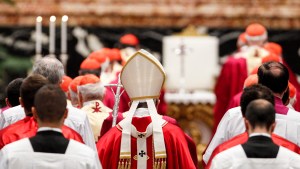On occasion you may run into some strange words being used to describe bishops.
For example, sometimes a particular bishop is called a “primate.” What does that mean?
Primate
In the English speaking world, “primate” has become closely associated with monkeys and apes.
When it comes to using it to refer to a bishop, it has nothing to do with mammals.
The Catholic Encyclopedia offers a brief explanation behind the original Latin word:
(Latin – primas, from primus, “first”). In the Western Church a primate is a bishop possessing superior authority, not only over the bishops of his own province, like the metropolitan, but over several provinces and metropolitans. This does not refer to episcopal powers, which each bishop possesses fully, but to ecclesiastical jurisdiction and organization, especially in national churches.
For example, in Poland, there was a Primate of Poland, who was essentially the leading bishop of the entire country.
There does exist a Primate of All Ireland, who is the leading bishop of Ireland and is a unifying figure.
At one time this title had certain privileges, but in the modern era, it has become simply an honorific title.
It historical in its origin and does not have a direct correlation with any duties that are given to a bishop from Rome.
There may be a few bishops who are still called the primate of their country, but it is a title that is slowly dying out.



